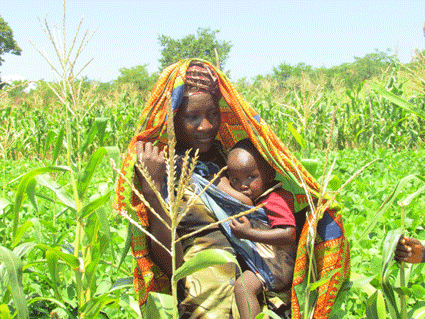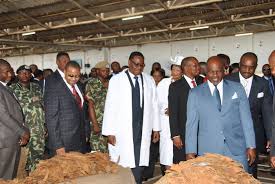In February 2012 several CIMMYT staff working in Sustainable Intensification of Maize-Legume Cropping Systems for Food Security in Eastern and Southern Africa (SIMLESA), including project leader Mulugetta Mekuria, Peter Setimela, and Isaiah Nyagumbo, as well as the national coordinators, made field visits and met with farmers who are collaborating in participatory trials in their own fields. SIMLESA is a four year program that was launched in March 2010 and is being funded by the Australian Centre for International Agriculture Research (ACIAR). The project has adopted mother-baby trials (MBT), where farmers choose varieties that interest them from a central “mother” trial and test them out on their own farms in “baby” trials, as a way of evaluating new drought tolerant maize and legume varieties under farmer-managed conditions.
In the Manica Province of Mozambique, SIMLESA has been able to gear up its MBT activities through collaboration with farmers’ association IDEEA-CA, reaching out to more farmers through the association’s networks in and around the province. Improved varieties, appropriate use of commercial fertilizers, and the adoption of conservation agriculture (CA) practices have the potential to significantly improve the livelihoods of poor resource farmers in the region. The “yellow trial”, for example—with replications with and without fertilizer—demonstrates the advantages of using fertilizers.
The trials have provided a voice for farmers as they try out new drought tolerant maize and legume varieties in their fields and have the opportunity to influence seed companies to multiply the varieties they prefer. “It took me two seasons to appreciate the yields of the new hybrid,” said Marcello Chikukwa of Sussundenga District. “I was suspicious of the small plant size as compared to our local variety. But I realised that the local variety takes long to mature and had too much herbage, and the stem was very tall but the yields were very low.”
The testimony of farmers like Chikukwa is building momentum as farmers gain exposure to new drought tolerant maize and legumes in combination with CA practices and fertilizer use. The project also facilitates the creation of seed road maps, collaborating with diverse partners to produce certified seed and run promotion activities. Seed companies like Dengo Commercial in Mozambique are participating in seed production and promotion of new drought tolerant varieties, which are expected to produce good yields despite erratic rainfall in the region. Nine maize varieties and ten soya bean varieties are being promoted in three districts of Mozambique and six districts in Malawi.




